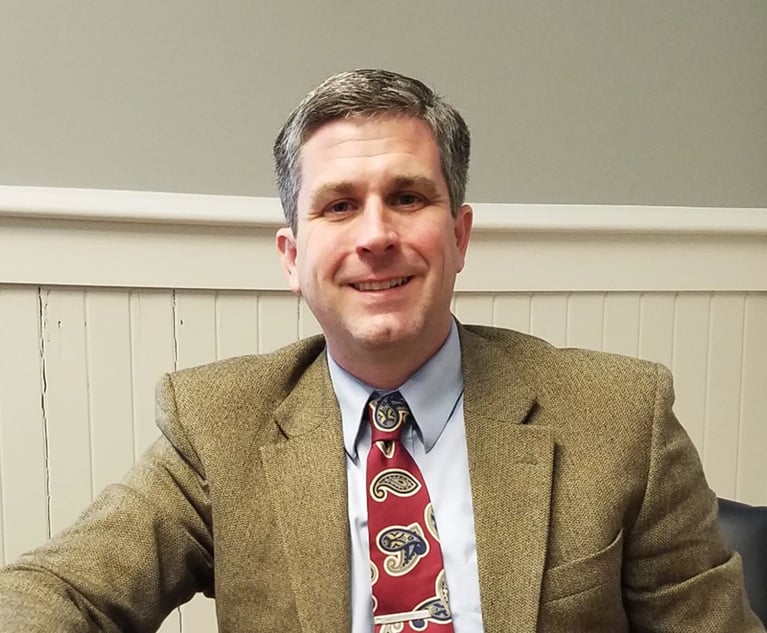Braves' Signing Scandal May Be Subject For Grand Jury, Reports Say
The league's GC said that although he's seen the news reports, he is not aware of any federal investigation of the league or of any team, and federal investigators have not contacted his office.
October 02, 2018 at 09:00 PM
4 minute read
The original version of this story was published on Corporate Counsel
 SunTrust Park rendering (Courtesy.)
SunTrust Park rendering (Courtesy.)
It's October, when the minds of Major League Baseball fans usually turn to the playoffs and World Series. But this year they also are turning to reports of a federal grand jury investigation into corruption in the MLB.
According to various news reports, led by Yahoo Sports last Friday, a federal grand jury is looking into possible bribes involved in the signing of international players from Latin America and the Dominican Republic, the smuggling of potential players into the U.S. from places like Cuba and the possible use of steroids on teenage prospects. Possible bribes could involve violations of the Foreign Corrupt Practices Act.
The Atlanta Braves, which face the Los Angeles Dodgers later this week in the Division Series, is the team most often mentioned in the news reports. Tomahawk Take, a knowledgeable Atlanta Braves fan website, went so far as to speculate that, if the grand jury found a pattern of teams involved in the same types of corruption, then federal prosecutors could conceivably invoke the RICO Act (Racketeer-Influenced and Corrupt Organizations) against the MLB and team officials.
Daniel Halem, the league's chief legal officer and the deputy commissioner of baseball, told Corporate Counsel Tuesday that he has seen the news reports. But Halem said he is not aware of any federal investigation of the league or of any team, and federal investigators have not contacted his office.
Greg Heller, chief legal officer and executive vice president of the Atlanta Braves, did not immediately return messages seeking comment. Neither did any spokesperson for the Braves.
The Boston Red Sox also have been penalized for violating international signing rules in the past.
But the news reports most often link the grand jury investigation to an MLB announcement last November on results of an investigation into the Braves' international signings. In that announcement, Baseball Commissioner Rob Manfred said the Braves had circumvented international signing rules.
In a severe penalty, the team was ordered to forfeit 13 international prospects and a third round draft pick this year. Former Braves general manager John Coppolella was barred for life from professional baseball. Gordon Blakeley, a former special assistant to Coppolella who, along with Coppolella resigned from the Braves in early October 2017, was given a one-year ban by MLB.
The grand jury is expected to speak with one or both men.
Yahoo Sports cited sources as saying the investigators also have subpoenaed people involved in the signing of Cuban star Hector Olivera, who negotiated a deal with the Los Angeles Dodgers before being traded to the Braves.
Tomahawk Take said Olivera will likely be asked how he escaped from Cuba and who he owes for the trip and how much. The site said other Cuban-born players and former players would probably be asked, as well.
MLB teams spend millions of dollars a year developing international amateur talent. The news reports suggest that illicit payments are often made to trainers of teenage boys in an effort to sign them and that the money could be funneled on to foreign officials, such as in immigration or passport offices.
A source told Mike Koehler, who writes the FCPA Professor blog, that “MLB scouting staff or other club employees may interact at various times with these officials to obtain identification documents for prospects, such as birth certificates and passports. … The reason why these points of contact create risk for clubs is that prospects, through their agents or handlers, commit rampant age and identity fraud in order to appear younger and thus increase their market value.”
The news reports say the FBI and members of the U.S. Department of Justice's FCPA unit are involved in the probe.
FCPA lawyer Ryan McConnell cited Ed Hanover—chief compliance officer for FIFA, which has had its share of bribe investigations—as saying sports organizations are a billion-dollar business that face the same risks as other global organizations.
McConnell, who founded the R. McConnell Group in Houston and writes occasional columns for Corporate Counsel, added that, just like any company, sports groups “need to look at their business and the risks faced and then manage them with an appropriate compliance program.”
This article first ran on Corporate Counsel, a Daily Report affiliate.
This content has been archived. It is available through our partners, LexisNexis® and Bloomberg Law.
To view this content, please continue to their sites.
Not a Lexis Subscriber?
Subscribe Now
Not a Bloomberg Law Subscriber?
Subscribe Now
NOT FOR REPRINT
© 2025 ALM Global, LLC, All Rights Reserved. Request academic re-use from www.copyright.com. All other uses, submit a request to [email protected]. For more information visit Asset & Logo Licensing.
You Might Like
View All
On The Move: Squire Patton Boggs, Akerman Among Four Firms Adding Atlanta Partners
7 minute read

Justice 'Weaponization Working Group' Will Examine Officials Who Investigated Trump, US AG Bondi Says

Trending Stories
- 1ACC CLO Survey Waves Warning Flags for Boards
- 2States Accuse Trump of Thwarting Court's Funding Restoration Order
- 3Microsoft Becomes Latest Tech Company to Face Claims of Stealing Marketing Commissions From Influencers
- 4Coral Gables Attorney Busted for Stalking Lawyer
- 5Trump's DOJ Delays Releasing Jan. 6 FBI Agents List Under Consent Order
Who Got The Work
J. Brugh Lower of Gibbons has entered an appearance for industrial equipment supplier Devco Corporation in a pending trademark infringement lawsuit. The suit, accusing the defendant of selling knock-off Graco products, was filed Dec. 18 in New Jersey District Court by Rivkin Radler on behalf of Graco Inc. and Graco Minnesota. The case, assigned to U.S. District Judge Zahid N. Quraishi, is 3:24-cv-11294, Graco Inc. et al v. Devco Corporation.
Who Got The Work
Rebecca Maller-Stein and Kent A. Yalowitz of Arnold & Porter Kaye Scholer have entered their appearances for Hanaco Venture Capital and its executives, Lior Prosor and David Frankel, in a pending securities lawsuit. The action, filed on Dec. 24 in New York Southern District Court by Zell, Aron & Co. on behalf of Goldeneye Advisors, accuses the defendants of negligently and fraudulently managing the plaintiff's $1 million investment. The case, assigned to U.S. District Judge Vernon S. Broderick, is 1:24-cv-09918, Goldeneye Advisors, LLC v. Hanaco Venture Capital, Ltd. et al.
Who Got The Work
Attorneys from A&O Shearman has stepped in as defense counsel for Toronto-Dominion Bank and other defendants in a pending securities class action. The suit, filed Dec. 11 in New York Southern District Court by Bleichmar Fonti & Auld, accuses the defendants of concealing the bank's 'pervasive' deficiencies in regards to its compliance with the Bank Secrecy Act and the quality of its anti-money laundering controls. The case, assigned to U.S. District Judge Arun Subramanian, is 1:24-cv-09445, Gonzalez v. The Toronto-Dominion Bank et al.
Who Got The Work
Crown Castle International, a Pennsylvania company providing shared communications infrastructure, has turned to Luke D. Wolf of Gordon Rees Scully Mansukhani to fend off a pending breach-of-contract lawsuit. The court action, filed Nov. 25 in Michigan Eastern District Court by Hooper Hathaway PC on behalf of The Town Residences LLC, accuses Crown Castle of failing to transfer approximately $30,000 in utility payments from T-Mobile in breach of a roof-top lease and assignment agreement. The case, assigned to U.S. District Judge Susan K. Declercq, is 2:24-cv-13131, The Town Residences LLC v. T-Mobile US, Inc. et al.
Who Got The Work
Wilfred P. Coronato and Daniel M. Schwartz of McCarter & English have stepped in as defense counsel to Electrolux Home Products Inc. in a pending product liability lawsuit. The court action, filed Nov. 26 in New York Eastern District Court by Poulos Lopiccolo PC and Nagel Rice LLP on behalf of David Stern, alleges that the defendant's refrigerators’ drawers and shelving repeatedly break and fall apart within months after purchase. The case, assigned to U.S. District Judge Joan M. Azrack, is 2:24-cv-08204, Stern v. Electrolux Home Products, Inc.
Featured Firms
Law Offices of Gary Martin Hays & Associates, P.C.
(470) 294-1674
Law Offices of Mark E. Salomone
(857) 444-6468
Smith & Hassler
(713) 739-1250






